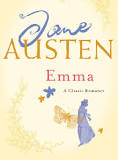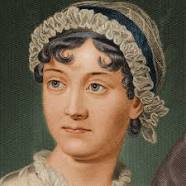Emma Page #9
Emma, by Jane Austen, is a novel about youthful hubris and the perils of misconstrued romance. The story takes place in the fictional village of Highbury and the surrounding estates of Hartfield, Randalls, and Donwell Abbey and involves the relationships among individuals in those locations consisting of "3 or 4 families in a country village". The novel was first published in December 1815 while the author was alive, with its title page listing a publication date of 1816. As in her other novels, Austen explores the concerns and difficulties of genteel women living in Georgian–Regency England; she also creates a lively comedy of manners among her characters and depicts issues of marriage, gender, age, and social status.
She had already satisfied herself that he thought Harriet a beautiful girl, which she trusted, with such frequent meetings at Hartfield, was foundation enough on his side; and on Harriet's there could be little doubt that the idea of being preferred by him would have all the usual weight and efficacy. And he was really a very pleasing young man, a young man whom any woman not fastidious might like. He was reckoned very handsome; his person much admired in general, though not by her, there being a want of elegance of feature which she could not dispense with:--but the girl who could be gratified by a Robert Martin's riding about the country to get walnuts for her might very well be conquered by Mr. Elton's admiration. CHAPTER V “I do not know what your opinion may be, Mrs. Weston,” said Mr. Knightley, “of this great intimacy between Emma and Harriet Smith, but I think it a bad thing.” “A bad thing! Do you really think it a bad thing?--why so?” “I think they will neither of them do the other any good.” “You surprize me! Emma must do Harriet good: and by supplying her with a new object of interest, Harriet may be said to do Emma good. I have been seeing their intimacy with the greatest pleasure. How very differently we feel!--Not think they will do each other any good! This will certainly be the beginning of one of our quarrels about Emma, Mr. Knightley.” “Perhaps you think I am come on purpose to quarrel with you, knowing Weston to be out, and that you must still fight your own battle.” “Mr. Weston would undoubtedly support me, if he were here, for he thinks exactly as I do on the subject. We were speaking of it only yesterday, and agreeing how fortunate it was for Emma, that there should be such a girl in Highbury for her to associate with. Mr. Knightley, I shall not allow you to be a fair judge in this case. You are so much used to live alone, that you do not know the value of a companion; and, perhaps no man can be a good judge of the comfort a woman feels in the society of one of her own sex, after being used to it all her life. I can imagine your objection to Harriet Smith. She is not the superior young woman which Emma's friend ought to be. But on the other hand, as Emma wants to see her better informed, it will be an inducement to her to read more herself. They will read together. She means it, I know.” “Emma has been meaning to read more ever since she was twelve years old. I have seen a great many lists of her drawing-up at various times of books that she meant to read regularly through--and very good lists they were--very well chosen, and very neatly arranged--sometimes alphabetically, and sometimes by some other rule. The list she drew up when only fourteen--I remember thinking it did her judgment so much credit, that I preserved it some time; and I dare say she may have made out a very good list now. But I have done with expecting any course of steady reading from Emma. She will never submit to any thing requiring industry and patience, and a subjection of the fancy to the understanding. Where Miss Taylor failed to stimulate, I may safely affirm that Harriet Smith will do nothing.--You never could persuade her to read half so much as you wished.--You know you could not.” “I dare say,” replied Mrs. Weston, smiling, “that I thought so then;--but since we have parted, I can never remember Emma's omitting to do any thing I wished.” “There is hardly any desiring to refresh such a memory as that,”--said Mr. Knightley, feelingly; and for a moment or two he had done. “But I,” he soon added, “who have had no such charm thrown over my senses, must still see, hear, and remember. Emma is spoiled by being the cleverest of her family. At ten years old, she had the misfortune of being able to answer questions which puzzled her sister at seventeen. She was always quick and assured: Isabella slow and diffident. And ever since she was twelve, Emma has been mistress of the house and of you all. In her mother she lost the only person able to cope with her. She inherits her mother's talents, and must have been under subjection to her.” “I should have been sorry, Mr. Knightley, to be dependent on your recommendation, had I quitted Mr. Woodhouse's family and wanted another situation; I do not think you would have spoken a good word for me to any body. I am sure you always thought me unfit for the office I held.” “Yes,” said he, smiling. “You are better placed here; very fit for a wife, but not at all for a governess. But you were preparing yourself to be an excellent wife all the time you were at Hartfield. You might not give Emma such a complete education as your powers would seem to promise; but you were receiving a very good education from her, on the very material matrimonial point of submitting your own will, and doing as you were bid; and if Weston had asked me to recommend him a wife, I should certainly have named Miss Taylor.” “Thank you. There will be very little merit in making a good wife to such a man as Mr. Weston.” “Why, to own the truth, I am afraid you are rather thrown away, and that with every disposition to bear, there will be nothing to be borne. We will not despair, however. Weston may grow cross from the wantonness of comfort, or his son may plague him.” “I hope not that.--It is not likely. No, Mr. Knightley, do not foretell vexation from that quarter.” “Not I, indeed. I only name possibilities. I do not pretend to Emma's genius for foretelling and guessing. I hope, with all my heart, the young man may be a Weston in merit, and a Churchill in fortune.--But Harriet Smith--I have not half done about Harriet Smith. I think her the very worst sort of companion that Emma could possibly have. She knows nothing herself, and looks upon Emma as knowing every thing. She is a flatterer in all her ways; and so much the worse, because undesigned. Her ignorance is hourly flattery. How can Emma imagine she has any thing to learn herself, while Harriet is presenting such a delightful inferiority? And as for Harriet, I will venture to say that she cannot gain by the acquaintance. Hartfield will only put her out of conceit with all the other places she belongs to. She will grow just refined enough to be uncomfortable with those among whom birth and circumstances have placed her home. I am much mistaken if Emma's doctrines give any strength of mind, or tend at all to make a girl adapt herself rationally to the varieties of her situation in life.--They only give a little polish.”
Translation
Translate and read this book in other languages:
Select another language:
- - Select -
- 简体中文 (Chinese - Simplified)
- 繁體中文 (Chinese - Traditional)
- Español (Spanish)
- Esperanto (Esperanto)
- 日本語 (Japanese)
- Português (Portuguese)
- Deutsch (German)
- العربية (Arabic)
- Français (French)
- Русский (Russian)
- ಕನ್ನಡ (Kannada)
- 한국어 (Korean)
- עברית (Hebrew)
- Gaeilge (Irish)
- Українська (Ukrainian)
- اردو (Urdu)
- Magyar (Hungarian)
- मानक हिन्दी (Hindi)
- Indonesia (Indonesian)
- Italiano (Italian)
- தமிழ் (Tamil)
- Türkçe (Turkish)
- తెలుగు (Telugu)
- ภาษาไทย (Thai)
- Tiếng Việt (Vietnamese)
- Čeština (Czech)
- Polski (Polish)
- Bahasa Indonesia (Indonesian)
- Românește (Romanian)
- Nederlands (Dutch)
- Ελληνικά (Greek)
- Latinum (Latin)
- Svenska (Swedish)
- Dansk (Danish)
- Suomi (Finnish)
- فارسی (Persian)
- ייִדיש (Yiddish)
- հայերեն (Armenian)
- Norsk (Norwegian)
- English (English)
Citation
Use the citation below to add this book to your bibliography:
Style:MLAChicagoAPA
"Emma Books." Literature.com. STANDS4 LLC, 2025. Web. 23 Feb. 2025. <https://www.literature.com/book/emma_29>.








Discuss this Emma book with the community:
Report Comment
We're doing our best to make sure our content is useful, accurate and safe.
If by any chance you spot an inappropriate comment while navigating through our website please use this form to let us know, and we'll take care of it shortly.
Attachment
You need to be logged in to favorite.
Log In